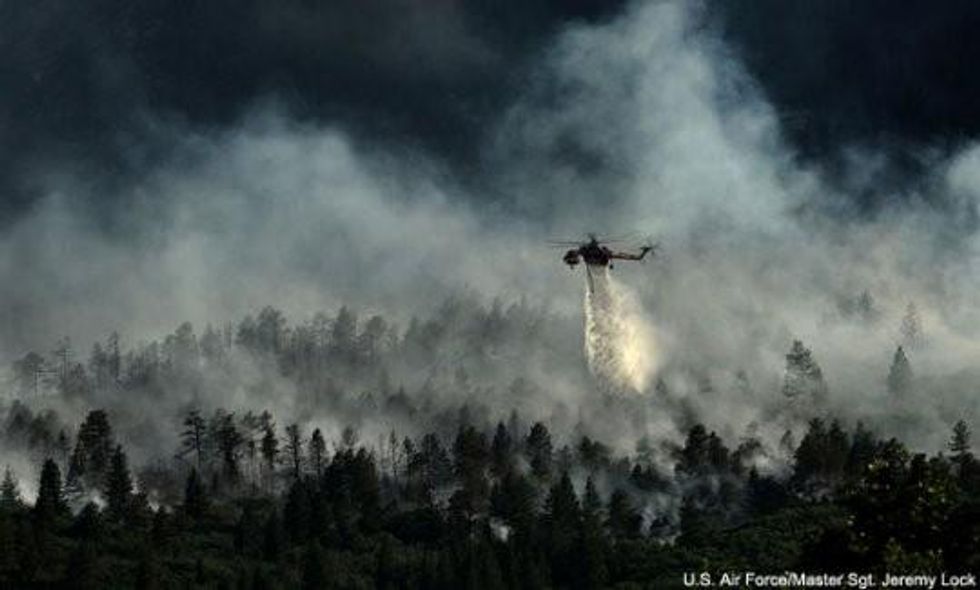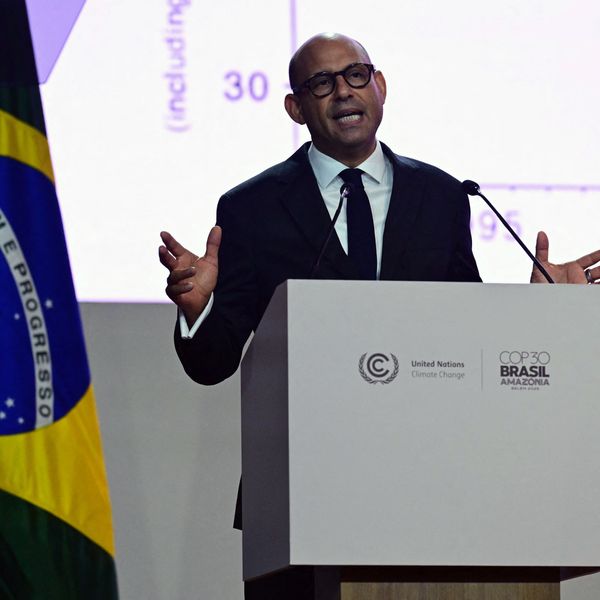Climate Change: 'This Is Just the Beginning'
Evidence supporting the existence of climate change is pummeling the United States this summer, from the mountain wildfires of Colorado to the recent "derecho" storm that left at least 23 dead and 1.4 million people without power from Illinois to Virginia.

More than 2,000 heat records were broken last week around the U.S. The National Oceanic and Atmospheric Administration (NOAA), the government agency that tracks the data, reported that the spring of 2012 "marked the largest temperature departure from average of any season on record for the contiguous United States." These record temperatures in May, NOAA says, "have been so dramatically different that they establish a new 'neighborhood' apart from the historical year-to-date temperatures."
In Colorado, at least seven major wildfires are burning at the time of this writing. The Waldo Canyon fire in Colorado Springs destroyed 347 homes and killed at least two people. The High Park fire farther north burned 259 homes and killed one. While officially "contained" now, that fire won't go out, according to Colorado's Office of Emergency Management, until an "act of nature such as prolonged rain or snowfall." The "derecho" storm system is another example. "Derecho" is Spanish for "straight ahead," and that is what the storm did, forming near Chicago and blasting east, leaving a trail of death, destruction and downed power lines.
Add drought to fire and violent thunderstorms. According to Dr. Jeff Masters, one of the few meteorologists who frequently makes the connection between extreme weather and climate change, "across the entire Continental U.S., 72 percent of the land area was classified as being in dry or drought conditions" last week. "We're going to be seeing a lot more weather like this, a lot more impacts like we're seeing from this series of heat waves, fires and storms. ... This is just the beginning."
Fortunately, we might be seeing a lot more of Jeff Masters, too. He was a co-founder of the popular weather website Weather Underground in 1995. Just this week he announced that the site had been purchased by The Weather Channel, perhaps the largest single purveyor of extreme weather reports. Masters promises the same focus on his blog, which he hopes will reach the much larger Weather Channel audience. He and others are needed to counter the drumbeat denial of the significance of human-induced climate change, of the sort delivered by CNN's charismatic weatherman Rob Marciano. In 2007, a British judge was considering banning Al Gore's movie "An Inconvenient Truth" from schools in England. After the report, Marciano said on CNN, "Finally. Finally ... you know, the Oscars, they give out awards for fictional films, as well. ... Global warming does not conclusively cause stronger hurricanes like we've seen." Masters responded to that characteristic clip by telling me, "Our TV meteorologists are missing a big opportunity here to educate and tell the population what is likely to happen."
Beyond the borders of wealthy countries like the United States, in developing countries where most people in the world live, the impacts of climate change are much more deadly, from the growing desertification of Africa to the threats of rising sea levels and the submersion of small island nations.
The U.S. news media have a critical role to play in educating the public about climate change. Imagine if just half the times that they flash "Extreme Weather" across our TV screens, they alternated with "Global Warming." This Independence Day holiday week might just be the beginning of people demanding the push to wean ourselves off fossil fuels, and pursue a sane course toward sustainable energy independence.
Denis Moynihan contributed research to this column.
An Urgent Message From Our Co-Founder
Dear Common Dreams reader, The U.S. is on a fast track to authoritarianism like nothing I've ever seen. Meanwhile, corporate news outlets are utterly capitulating to Trump, twisting their coverage to avoid drawing his ire while lining up to stuff cash in his pockets. That's why I believe that Common Dreams is doing the best and most consequential reporting that we've ever done. Our small but mighty team is a progressive reporting powerhouse, covering the news every day that the corporate media never will. Our mission has always been simple: To inform. To inspire. And to ignite change for the common good. Now here's the key piece that I want all our readers to understand: None of this would be possible without your financial support. That's not just some fundraising cliche. It's the absolute and literal truth. We don't accept corporate advertising and never will. We don't have a paywall because we don't think people should be blocked from critical news based on their ability to pay. Everything we do is funded by the donations of readers like you. Will you donate now to help power the nonprofit, independent reporting of Common Dreams? Thank you for being a vital member of our community. Together, we can keep independent journalism alive when it’s needed most. - Craig Brown, Co-founder |

More than 2,000 heat records were broken last week around the U.S. The National Oceanic and Atmospheric Administration (NOAA), the government agency that tracks the data, reported that the spring of 2012 "marked the largest temperature departure from average of any season on record for the contiguous United States." These record temperatures in May, NOAA says, "have been so dramatically different that they establish a new 'neighborhood' apart from the historical year-to-date temperatures."
In Colorado, at least seven major wildfires are burning at the time of this writing. The Waldo Canyon fire in Colorado Springs destroyed 347 homes and killed at least two people. The High Park fire farther north burned 259 homes and killed one. While officially "contained" now, that fire won't go out, according to Colorado's Office of Emergency Management, until an "act of nature such as prolonged rain or snowfall." The "derecho" storm system is another example. "Derecho" is Spanish for "straight ahead," and that is what the storm did, forming near Chicago and blasting east, leaving a trail of death, destruction and downed power lines.
Add drought to fire and violent thunderstorms. According to Dr. Jeff Masters, one of the few meteorologists who frequently makes the connection between extreme weather and climate change, "across the entire Continental U.S., 72 percent of the land area was classified as being in dry or drought conditions" last week. "We're going to be seeing a lot more weather like this, a lot more impacts like we're seeing from this series of heat waves, fires and storms. ... This is just the beginning."
Fortunately, we might be seeing a lot more of Jeff Masters, too. He was a co-founder of the popular weather website Weather Underground in 1995. Just this week he announced that the site had been purchased by The Weather Channel, perhaps the largest single purveyor of extreme weather reports. Masters promises the same focus on his blog, which he hopes will reach the much larger Weather Channel audience. He and others are needed to counter the drumbeat denial of the significance of human-induced climate change, of the sort delivered by CNN's charismatic weatherman Rob Marciano. In 2007, a British judge was considering banning Al Gore's movie "An Inconvenient Truth" from schools in England. After the report, Marciano said on CNN, "Finally. Finally ... you know, the Oscars, they give out awards for fictional films, as well. ... Global warming does not conclusively cause stronger hurricanes like we've seen." Masters responded to that characteristic clip by telling me, "Our TV meteorologists are missing a big opportunity here to educate and tell the population what is likely to happen."
Beyond the borders of wealthy countries like the United States, in developing countries where most people in the world live, the impacts of climate change are much more deadly, from the growing desertification of Africa to the threats of rising sea levels and the submersion of small island nations.
The U.S. news media have a critical role to play in educating the public about climate change. Imagine if just half the times that they flash "Extreme Weather" across our TV screens, they alternated with "Global Warming." This Independence Day holiday week might just be the beginning of people demanding the push to wean ourselves off fossil fuels, and pursue a sane course toward sustainable energy independence.
Denis Moynihan contributed research to this column.

More than 2,000 heat records were broken last week around the U.S. The National Oceanic and Atmospheric Administration (NOAA), the government agency that tracks the data, reported that the spring of 2012 "marked the largest temperature departure from average of any season on record for the contiguous United States." These record temperatures in May, NOAA says, "have been so dramatically different that they establish a new 'neighborhood' apart from the historical year-to-date temperatures."
In Colorado, at least seven major wildfires are burning at the time of this writing. The Waldo Canyon fire in Colorado Springs destroyed 347 homes and killed at least two people. The High Park fire farther north burned 259 homes and killed one. While officially "contained" now, that fire won't go out, according to Colorado's Office of Emergency Management, until an "act of nature such as prolonged rain or snowfall." The "derecho" storm system is another example. "Derecho" is Spanish for "straight ahead," and that is what the storm did, forming near Chicago and blasting east, leaving a trail of death, destruction and downed power lines.
Add drought to fire and violent thunderstorms. According to Dr. Jeff Masters, one of the few meteorologists who frequently makes the connection between extreme weather and climate change, "across the entire Continental U.S., 72 percent of the land area was classified as being in dry or drought conditions" last week. "We're going to be seeing a lot more weather like this, a lot more impacts like we're seeing from this series of heat waves, fires and storms. ... This is just the beginning."
Fortunately, we might be seeing a lot more of Jeff Masters, too. He was a co-founder of the popular weather website Weather Underground in 1995. Just this week he announced that the site had been purchased by The Weather Channel, perhaps the largest single purveyor of extreme weather reports. Masters promises the same focus on his blog, which he hopes will reach the much larger Weather Channel audience. He and others are needed to counter the drumbeat denial of the significance of human-induced climate change, of the sort delivered by CNN's charismatic weatherman Rob Marciano. In 2007, a British judge was considering banning Al Gore's movie "An Inconvenient Truth" from schools in England. After the report, Marciano said on CNN, "Finally. Finally ... you know, the Oscars, they give out awards for fictional films, as well. ... Global warming does not conclusively cause stronger hurricanes like we've seen." Masters responded to that characteristic clip by telling me, "Our TV meteorologists are missing a big opportunity here to educate and tell the population what is likely to happen."
Beyond the borders of wealthy countries like the United States, in developing countries where most people in the world live, the impacts of climate change are much more deadly, from the growing desertification of Africa to the threats of rising sea levels and the submersion of small island nations.
The U.S. news media have a critical role to play in educating the public about climate change. Imagine if just half the times that they flash "Extreme Weather" across our TV screens, they alternated with "Global Warming." This Independence Day holiday week might just be the beginning of people demanding the push to wean ourselves off fossil fuels, and pursue a sane course toward sustainable energy independence.
Denis Moynihan contributed research to this column.

